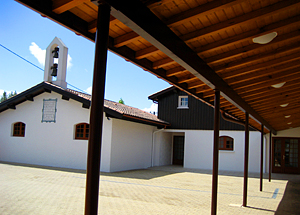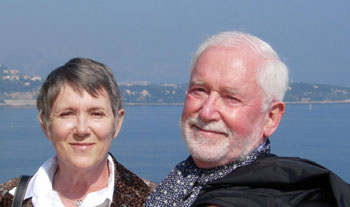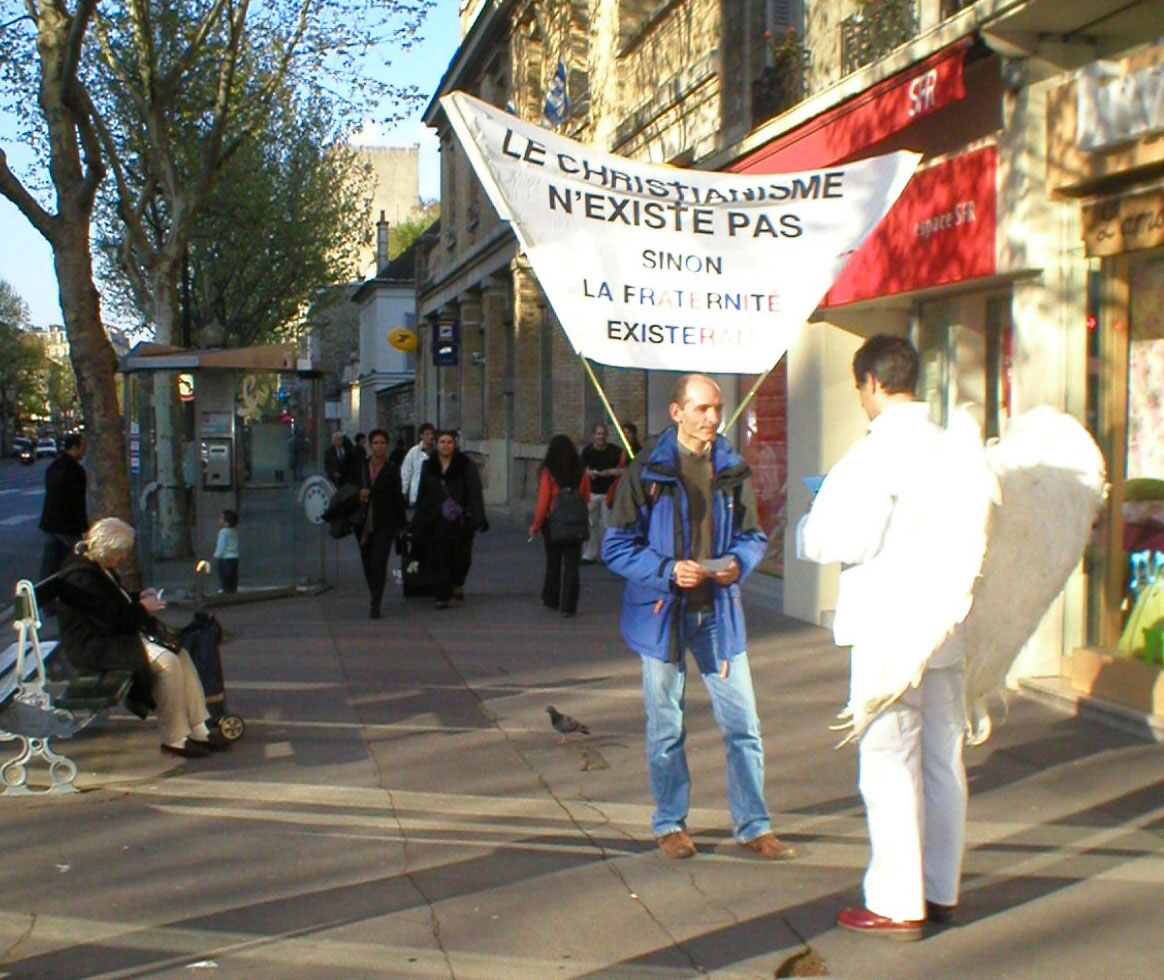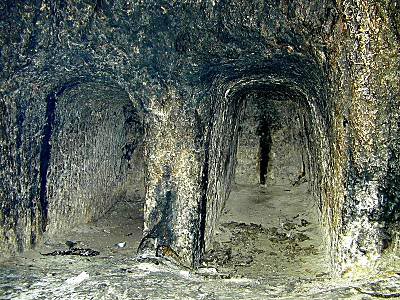
| july 7, 2006
(0033us) my iraki brethen unknown (2) |
|
These
baghdadi
citizens, a housewife, a teenager, still little
adapted to democracy, senselessly, as if in a panic
walk through Baghdad's traffic congestion, on July
1st.
 Are
they unaware that democracy is sovereignty at last
given to citizens? This is why every neighborhood of
Baghdad is now handed over to a citizen who freely
controls it, assisted by a legion (scoffing people
call it a "mob", pooh!) of volunteers. That "emir"
"dispenses justice" and "presides over prayer" in
his neighborhood, decides "in everyone's interest" on
the goods to be allowed to enter or pass via the
neighborhood and the fees to be paid to him for them,
on the persons allowed to cross the neighborhood, and
on who may live here and who shall stop living here,
etc. In the capital city, all the neighborhoods taken
together, there are about 1,000 "sentences enforced" a
month (scoffing people say "murders", bah!) let alone
the "shelterings" (scoffing people call them
"abductions", pooh!). No one knows what happens
elsewhere in the country, for the circulation of news
has been abolished so that the abolition of Saddam
Hussein's censorship may be assured in full. The Iraqi
government that the Americans have had voted for are
useless, because a happy people have no need for
government. The government have issued an offer of
amnesty to every citizen who, because he had felt way
too free to show his opinion, has "killed less than
2.500 people" (in reading this four-digit number I
have sudden nervous mirth). So you are a murderer only
with 2,501 or more corpses. Has any national community
in History ever been able to boast such freedom and
broadmindedness? Are
they unaware that democracy is sovereignty at last
given to citizens? This is why every neighborhood of
Baghdad is now handed over to a citizen who freely
controls it, assisted by a legion (scoffing people
call it a "mob", pooh!) of volunteers. That "emir"
"dispenses justice" and "presides over prayer" in
his neighborhood, decides "in everyone's interest" on
the goods to be allowed to enter or pass via the
neighborhood and the fees to be paid to him for them,
on the persons allowed to cross the neighborhood, and
on who may live here and who shall stop living here,
etc. In the capital city, all the neighborhoods taken
together, there are about 1,000 "sentences enforced" a
month (scoffing people say "murders", bah!) let alone
the "shelterings" (scoffing people call them
"abductions", pooh!). No one knows what happens
elsewhere in the country, for the circulation of news
has been abolished so that the abolition of Saddam
Hussein's censorship may be assured in full. The Iraqi
government that the Americans have had voted for are
useless, because a happy people have no need for
government. The government have issued an offer of
amnesty to every citizen who, because he had felt way
too free to show his opinion, has "killed less than
2.500 people" (in reading this four-digit number I
have sudden nervous mirth). So you are a murderer only
with 2,501 or more corpses. Has any national community
in History ever been able to boast such freedom and
broadmindedness?Fortunately, "bloodthirsty potentate" Saddam Hussein, who in his day had given rise to a "peace, but a tyrannical one," in the country until Zorro showed up and unshackled the nation's frustrated energy, will be sentenced and hanged. His more than suspect moderation—only a few hundreds of people placed under arrest and (on average) a few dozens of executions a year—brings the proof that a dangerous liberticide used to oppress Iraq, where all you want to do you do freely now, at last. "Al-Bayyan Al-Jadidah", a Baghdad daily, "defeatist and undemocratic" (according to a US Army news bulletin), reports that que "The country is being on the verge of ruin and becoming rife with violence and assassination [...] Iraq is now a jungle where the weak have fallen prey of the strong and fraternity is disintegrating into sectarian fights [...] This is the result of the Americans and Britons' military intervention [...]" |
| Comments posted (np) Post a comment |
| june 26, 2006
(0032us) my iraki brethen unknown |
 Every year at
Pilgrimage time, I do not restrict my piety to its
essential purpose — which all of Arès Pilgrims
(see #0017us) share: going back to the Word's
roots on the place where the Creator in person
replanted them —. I add to it a mortification
(Rev
of Arès 33/26+)
for our deceased brothers and sisters,
whom I can feel in attendance invisible on this
place where they used to pray together with us. Every year at
Pilgrimage time, I do not restrict my piety to its
essential purpose — which all of Arès Pilgrims
(see #0017us) share: going back to the Word's
roots on the place where the Creator in person
replanted them —. I add to it a mortification
(Rev
of Arès 33/26+)
for our deceased brothers and sisters,
whom I can feel in attendance invisible on this
place where they used to pray together with us.In 2006, I add on to it my alms to more dead people, a mortification for the Iraqi who ever since 2003 have died of war violence in loneliness without relatives or friends' weeping for them (33/34). In the Baghdad morgue alone 49,137 people who had died a violent death (shot execution style, beaten to death, tortured, beheaded, etc.) were recorded from April 5 to June 1st, 2006. Let's note in passing that the number ought to be increased by the number, undisclosed, of the Iraqi military and police casualties. The province of Al-Anbar between Baghdad and Syria has been enduring disturbances (administration in a state of chaos, continual violence, telephone shortage) so that no statistics on war victims have been drawn up three years. Some Iraqi officials assess the Iraqi who have died of war violence at more than 100,000 since March 2003; other officials say the number may reach 200,000 or even more. In a 22-million population it is equivalent to 1%! In the same period 2,520 US troops were killed, which is significant, as it is, as regards an overequipped invader. In short, while Saddam Hussein is currently taken to court over the execution of 148 Iraqi and likely to be condemned to death, we could, if we were not opponents of the death penalty and if we tended to have black humor, wonder what sort of punishment would be appropriate for the US administration, which ever since they attacked Iraq have been causing 1,000 times as many deaths as Saddam Hussein is being tried for. |
| Comments posted (2) Post a comment |
| june 21, 2006
(0031us) the arès pilgrimage opens |
 Every
summer in Arès, France (33740, Gironde), 46 avenue de
la Liberation, Every
summer in Arès, France (33740, Gironde), 46 avenue de
la Liberation,from June 21 to July 4, from July 12 to 25 and from August 2 to 15. Opening of the Theophanic place (where the Maker manifested in 1977): on Friday, 08:30 am to 11:30 am, on Saturday, on Sunday, on July 14 and August 15 (except when they fall on a Friday) 05:30 pm to 09:00 pm, on other days, 06:00 pm to 09:00 pm. Every pilgrim prays and/or meditates freely without disturbing the others. Who goes in pilgrimage to Arès? First of all people at the age of free (Rév of Arès 10/10) conscience, who have welcomed the Word (Bible, Quran), who know their recalcitrance, that is, who know good from evil, love from indifference and hatred, forgiveness from the spirit of judgement, (36/16), peace from conflict, spiritual intelligence (32/5) from intellectual intelligence, who have heard the Father's request and converted to The Revelation of Arès, the light that dispels the darkness of religious interpretations, who have decided to stop sinning and enter upon penitence, that is, practice good and not act evil, in short, men of the time to come (Rev of Arès 30/13). But also anybody else, even a nonbeliever, provided that he does not come just out of curiosity, and that his visit makes sense, if he states his respect for The Revelation of Arès, the Bible and the Quran, and states that love of all men and forgiveness of offenses form the key to happiness. What does a pilgrim come for? For taking the Fire from the very Hand of the Maker, who manifested and spoke The Revelation of Arès on that very place in 1977, and who has never left it (I am here... Rev of Arès XLI/1-8, XLVIII/9). How to take the Fire? Every pilgrim goes about it in whatever way he conceives or feels deep down, provided it is a dignified and discreet one. In general, a pilgrim strikes with his forehead (XLI/4) and kisses (his lip takes... XLVIII/9) the spot, marked with a plain elliptic wooden frame, where the central Light rose and stood on the 1977 theophany days, and then he goes and sits down anywhere in the hall to kindle or rekindle, by praying and/or pondering, every reason he has and his willpower to bring humanity, first of all his own humanity, to recover its spiritual source (Rev of Arès 24/4). Why is every pilgrim advised to take off his or her shoes and put on a tunic (which anybody has no personal tunic can borrow)? One takes one's shoes off just as Moses did where the Maker was to speak to him (Exodus 3/5). The tunic blots out the sexes, the clothes of beautiful or poor quality and the fear of the judgement of others (fear of what makes people giggle or be impatient), which divides and breaks up society (Rev of Arès 10/13-14)? The tunic, which becomes the coot or kitoneth when used as a shroud, is also a reminder that one has to die as long as a small remnant have not defeated sin (28/12). The pilgrim's thought: The Abrahamic religion: judaism, christianity and islam, has changed into noise substituting for God's Word in Jerusalem (Rev of Arès XLVII/2). Hence the Father's moving house to France. The loving Father (Rev of Arès 12/7), however, does not doom religion to hell (For all that don't gather that those men have met perdition... 16/2), but he is harshly critical of it. Notably, religion has distorted the concept of salvation. Religion has preached personal salvation, while in fact it is inseparable from global salvation. Religion has preached salvation as if it was dependent on Heaven's judgment, while in fact it depends only and existentially on man's behavior. Only penitence (practice of Good and refusal to sin) saves and, just as the Father cannot live without his human creature, his son, no penitent gets saved if he or she does not strive (as far as his or her circumstances permit) to save other men, his brothers (Save! Do not judge! Rev of Ares 27/3). Every penitent is a harvester of penitents, The Revelation of Arès states. The pilgrim deep down undertakes or re-undertakes to awaken spiritual life, that is, Good, in himself as well as in others. A man does not go to Arès to beg for a miracle. Quite the contrary, he goes there to give himself as a miracle, the miracle of his faith in the self-redeeming effort (penitence), which The Revelation of Ares calls on man to make. Any man can be made a God, just as Jesus was, only by setting his steps in the Steps of the Father (Rev of Ares 2/12-13). This spiritual rerooting is turning most necessary in the early 21th century. Problems, which man recently still thought had been left behind after the struggles, wars and hardships of the 20th century, are re-emerging ahead of him, social, political, economical and even only human. The Father came back to speak to men by the end of the 20th century, because he was well aware that perils: rivalry, deception, hatred, violence and war, would be experienced again. The Father came back to remind man that he is the Creator's image (Genesis 1/27) and therefore can generate his own grace, his own miracle, if he wants to. The pilgrim asserts that he wants to. If I had not seen the Pilgrimage to Arès re-open every year, on June 21st, a feeling of failure would have eventually overcome me. For 32 years, ever since 1974, I have seen thousands and thousands of believers come to Arès filled with hope, and then never come again, because they were disappointed, reluctant to admit that is is too easy to lose faith and that the situation was bound to get worse, if they failed to understand that not God but man is the cause of evil. I can see numerous men elsewhere, jews, christians, muslims, humanists, who expected Good to establish on earth at last, now giving up hope that the world could draw lessons from the horrendous 20th century, ever. I can see a lot of silly and unfair actions taken by the men that claim they are capable of ruling the world, in short, I can see so many things likely to bring crowds to think that evil is to remain strongest. Yes, I would suffer from a terrible feeling of failure, if there was not Arès, the place where I go on pilgrimage to reaffirm my hope. I know that the world of tomorrow has already been born into the square foot where the stick of light rose and stood in 1977. No, evil will not forever be stronger than Good. No, violence, injustice, domination and despoliation will not stay perpetual. Yes, man will gain perpetual happiness. This is the profound meaning of the Arès Pilgrimage. |
| Comments posted (2) Post a comment |
| June 10, 2006
(0030us) bliss of freedom vs freedom of bliss |
 Bebert
(a diminutive for Albert), where have you got to?
If, an angel playing its part, you happen to read
this blog, remember the hot summer day in 1944 when
we you and I lived the wild bliss of the freedom
that lasts the time a liberation lasts. How about
making the world enjoy the freedom of perpetual,
spiritual bliss? Bebert
(a diminutive for Albert), where have you got to?
If, an angel playing its part, you happen to read
this blog, remember the hot summer day in 1944 when
we you and I lived the wild bliss of the freedom
that lasts the time a liberation lasts. How about
making the world enjoy the freedom of perpetual,
spiritual bliss?On that day it was around 02:00 pm in Suresnes, Paris suburbs, France, the alarm sirens were hooting, my mother and I we were running to the air raid shelters (I can't remember where my sister was). You Bebert were passing by, you shouted to me, "Michel, come with me! The Americans 've got at Chaville." My mother couldn't keep me by her, I followed you. We were running along the Seine River when, not far from Bleriot industry, we sighted something moving between trees across the river, in Bois de Boulogne (the Wood of Boulogne). At first it was a color. Barely perceptible, dark, a greenish khaki unlike the usual brownish German khaki. We were two 15-year-old young men, already matured by the war, but still agile like kids we threw ourselves into the tall grass on the river bank. The thing was slowly heading towards Suresnes Bridge, from which we had been coming. And then the thing grew less indistinct: a tank, its shape as unfamiliar as its khaki. Our hearts started pounding hard. The tank was moving along in stunning silence — We didn't know that the armored vehicles made in USA had rubber caterpillars —. Suddenly, something loomed up visible on the tank side... I yell, yes, I yell and my eyes get wet with tears just writing it. This was, stencilled white, France in silhouette with the Lorraine cross in it and elsewhere on the armor plate three colors, blue, white and red... A tank of General Leclerc's Division was scouting ahead into Paris through Boulogne Wood. The US Army had stopped and given way to the 1st French Army, so that it might enter the capital city first. Whoever has never experienced such a historical time after four years of fear, destitution, misery, censorship and humiliation, cannot imagine the felicity of the liberation! All of a sudden we were aware that the prisoners in Mont Valerien, who every morning were shot in the fortress moats, would not be shot tomorrow, we were aware that the SS in black and the Gestapo had already been fleeing and we would no longer have to step off the sidewalk into the gutter to let them walk the surface of earth. Bebert, just recall the tank looking as wonderful as if it was adorned with Monet's nymphea and hovering over the ground like an angel. Its gun got pointed at us and kept so as long as the tank sergeant suspected us to be Germans in the tall grass across the river, but if it was archangel Michael drawing his blazing sword we would not be filled with more wonder. And then the turret swivelled and got back lined up with the tank, when the tank sergeant realized that we were just two boys both laughing and crying, wild, altogether wild with joy. Jesus, I own up to feeling as intensely emotional, but far less blissful, on the night I saw you, on January 15, 1974. Because your corporeal presence suddenly made me feel my own obscurity, my shame (Rev of Ares 1/1) and my evil I was embodying just as every man of this generation embodies evil. August 1944's tank was setting me free, instead. For several moments we Bebert and I felt as if we were a one huge light, a one felicity, which nothing would exceed in importance and intensity in our lifetimes, ever. Nothing? But are we really unable to help the world exceed its scarce short felicities, by prompting it to change (Rev of Ares 28/7)? Hey Bebert, Albert Dumur, where have you got to? We were atheistic, children of Paris red suburbs. Your father had died in 1943; my father in 1942. Today, do you belong among the millions of men that, after having observed the world 62 years , ever since 1944, have seen that even though religion and politics have tried to correct a lot of errors, nothing has altered — and even a lot of facts may have worsened — the whole picture of sin and of evil, which sin generates? Why? Because, as long as man constantly calls for the safeguard of politics, law and even religion at times, he is to remain irresponsible for himself and unable to change himself or the system. This is another way of saying what The Revelation of Ares says! Bebert, when will we send our penitence tanks covered in flowers to liberate the world? When will we point at sin that has controlled it our weapons: love, forgiveness, peace, spiritual freedom, in short, intelligence (Rév d'Arès 32/5) reappearing at last ? |
| Comments posted (1) Post a comment |
| June 1st, 2006
(0029us) the next edition of the revelation of arès in the making |
|
Read
no
further
if you dislike the way Brother Michel has edited The
Revelation
of Ares.
"Ugly... Too big... Too complicated... Not an easy-does-it approach of  the Event of Ares...
Theological-looking (and even bigoted-looking and
preachy-style) comments, etc." the Event of Ares...
Theological-looking (and even bigoted-looking and
preachy-style) comments, etc."But to me it's a work of love! I've begun preparing the next French edition of this Word of the Father, and please don't think that I overlook the plentiful feedback I've got for years from a lot of people on my way of editing it. Unfortunatly, the remarks and suggestions were miscellanious, many in contradiction to each other, so much so that that I eventually felt neutralized, mentally drained, for a good while. At last, lately, I came to decide to excogitate and carry out the next edition by myself once again. I am giving lengthy consideration of the project, however, with a view to making the book clearer, more attractive and modern... Modern insofar as a material related to the Maker's eternal Word can be modern. I hope that my brothers and sisters in faith as well as French-speaking people as a whole will like, or at least will not too much complain about, the edition currently in the making. In any case, it will once more be an honest work, even though it will be a hard long-drawn-out work, as I mean to edit it in a manner different from the previous ones. The main Word will have a different paragraphing, spaced out with short titles, so that the book will be both less big and less difficult to sort out in concepts. The comments, no more comments than those necessary for new readers, will be very short and bigger in font size. Whatever form I've given the Father's Word, the work always has been an epiphany to me. That's why I say "a work of love." Not that I witness new appearances or manifestations of the Father or his messenger Jesus, but I get from this work a renewed perception of the salvatory essential nature of the Word, that is, Life. Photo: As Sister Christiane had realized that the visitors to this blog would be pleased to see new pictures, she shot me in my study yesterday, May 31st. Being a servant of the Father as well as a cook, housewife and grand-mother much better than a photographer, her first shot was good (the next nine shots were not so happy, but digital cameras are marvels, you delete the pictures that haven't come out, so no waste of film). You can see me working on the next edition of The Revelation of Ares. |
| Comments
posted (3) Add
a comment |
| may 24, 2006
(0028us) waiting for godot or waiting for salvation |
|
The
afterlife
salvation? In concrete terms, The
Revelation of Ares says little or nothing
about it. In spiritual terms, it is the strength to
overcome darkness, fear (16/6),
powerlessness of existence devoid of its corporeal scaffolding
(17/2), while waiting for absolute salvation,
which is to occur on the Day of
re-creation and transfiguration of man pieced
together again, flesh, mind and soul.
Among the whole Word that Abraham's descendants have been handed down only the Quran depicts the salvation of the just Paradise, a word never found in The Revelation of Ares, in a way past the stage of mere ideas like the idea given by Luke 16/23 (Poor Lazarus in Abraham's bosom). Nonetheless, the Quran's materiality of the depictions are allegories rather than realities, unless they are related to absolute salvation, that is, life after the resurrection Day (Rev of Ares 35/2-3).  About
the salvation immediately after death The
Revelation of Ares concretely says almost
nothing. It sets out death as the falling apart of
man's three constituents: the flesh, the mind and
the soul (Rev of Ares 17/7). She warns,
recommending that the living mortify for the
dead (Rev of Ares 33/32-34), that the time
of death is a trial to all men even to the
virtuous (Rev of Ares XL/15). Death
is anomaly, since the flesh dies of the congenital
plague, sin, inherited from Adam (Rev
of Ares 2/1-5), that mankind will recover from
only by agreeing to do penitence for generations
(24/2). About
the salvation immediately after death The
Revelation of Ares concretely says almost
nothing. It sets out death as the falling apart of
man's three constituents: the flesh, the mind and
the soul (Rev of Ares 17/7). She warns,
recommending that the living mortify for the
dead (Rev of Ares 33/32-34), that the time
of death is a trial to all men even to the
virtuous (Rev of Ares XL/15). Death
is anomaly, since the flesh dies of the congenital
plague, sin, inherited from Adam (Rev
of Ares 2/1-5), that mankind will recover from
only by agreeing to do penitence for generations
(24/2).When you die at the age of conscienceness (children and simple people do not have salvation problems, the Scripture suggests) either you have only the mind or you have the mind the soul left. The mind alone can act as nothing but a freezing shroud for you (17/7), a metaphor for spiritual sterility (the abyss) and suffering unconsciousness (17/5) of the specter (4/6-7). On the other hand, the soul, if you have made yourself a soul by acting with goodness (Rev of Ares vigils 17 & 18), love, forgiveness, peace, rejection of prejudices (freedom), with faith or religion as well as without any, the soul drives you out of the abyss like a sail driven by the spiritual wind, which you used to blow while you were alive. What you bring along with you is the strength you gave yourself on earth. The area the soul moves to is not described, probably because afterlife salvation is not the conclusion of spiritual life. The finality of spiritual life is absolute salvation, the one salvation described in The Revelation of Ares, the one bound to come later on after the Day has occurred (Rev of Ares 17/7, 31/8-12, 33/9, etc). Let's mention the 2d of October, however, when I was propelled out of time and out of my own vulnerability throughout the universe. This trial may well give a concrete idea of the soul's way of life while waiting until the Day occurs. "Why," some people ask me, "do you balk at telling about that extraordinary trial?" I happen to reply, "Because on that day, like I was one of the two misfits in Waiting for Godot, Vladimir and Estragon, I learned for a few minutes that, as I was a man, I was a metaphysical animal—Ionesco used to say so about Samuel Becket's play—. It was not me, it was the Maker who depicted my own trial in The Revelation of Ares (VI/1-4), because none of men can describe his reunion with his own spiritual substance. That reunion can't be shared, it is as inconceivable as Godot, God himself, pretty much!" I happen to tell some visitors, who are then disconcerted, "I don't know what God is, I have but experienced him just as you've read from The Revelation of Ares. From the experience no really informative description of him can be drawn, but, though poor, it is honestly true. Likewise, my idea of salvation is honestly true. I don't know much about it, but I'm aware that we do not die, and that what a human brings along with him or her is roughly all he or she has made good or bad, positive or negative, when he or she was corporeal." Picture: I've got few photos. I have not much thought of myself. Just the same, here's a recent picture (April, 2006) together with my wife Christiane, taken by our daughter Sara. |
| Comments
posted (1) Add
a comment |
| may 15, 2006
(0027us) the eldest duck-legged fish |
|
Would
the
Ares Pilgrims be against evolution, as rumor has it?
Quite the contrary. Let's reword The Revelation
of Ares, which dubs me eldest brother
(16/1), so I turn into the eldest
tiktaalik. What's dat?
If the Ares Pilgrims were against evolution, they would not believe in what is essential in The Revelatioon of Ares, that is, the fact that man has been able to demean himself, fall (Adam, Rev of Arès 2/1-5 and VII/8-16), and that he is likewise able to straigten up (1/1), get over sin, evil and misfortune, resume his spiritual position as the creator's son and as co-creator, therefore.  If
we,
you or I or every one of men, can evolve, it is
because evolution is a global ability of everything in
the creation. A new proof of evolution has lately
appeared: A tiktaalik roseae (picture), a fish with
embryonic legs, a 375-million-year fossil the name of
which means "large fish in the stream" in Inuit
(Eskimo), has been dug out of Ellesmere Island,
Canada. The fossil shows that terrestrial life has
come out of the sea. Some fish have grown legs, which
enabled them to crawl along, and then later walk, on
shores. So doing they have developped their brains. If
we,
you or I or every one of men, can evolve, it is
because evolution is a global ability of everything in
the creation. A new proof of evolution has lately
appeared: A tiktaalik roseae (picture), a fish with
embryonic legs, a 375-million-year fossil the name of
which means "large fish in the stream" in Inuit
(Eskimo), has been dug out of Ellesmere Island,
Canada. The fossil shows that terrestrial life has
come out of the sea. Some fish have grown legs, which
enabled them to crawl along, and then later walk, on
shores. So doing they have developped their brains.To us anything an animal can do corporally and cerebrally we humans can, particularly as far as morality and spirituality are concerned, because these are in great need of improvement. So we believe in The Revelation of Ares's verses: ...I (Creator) breathe silently into men's chests. For the Truth is, the world has to change (Rev of Ares 28/6-7). Everything changes, which is essential truth and, what's more, everything has to change. Everything is able to change, therefore. Besides, The Revelation of Ares adds, do not finery and joy suit to him who has changed his life (30/11)? Why, then, the legless fish, the representatives of organizations like Mivilude, Adfi, Ccmm, etc., who claim that they throw light on some "dangers" to "youth and families", issued a while ago a "record" which spreads a warning that we are "a sect devoted to illegal healing"? —A blunder not really abusive but doubly false, as the Ares Pilgrims do not have a sectarian spirit and do not practice healing, whatever, are now telling that we are "people behind the time, opponents of evolution"? I happen to guess, however, why they spread such untruths. First, because they heve never read The Revelation of Ares or the books related to it. Second, because they find it a justifiable parry that falsities are spoken up against whatever disconcerts them. Why? Simply, because we have left the abyss of the "religiously correct", the "politically correct", the "atheistically correct", in short, the "correct thought" abyss, and we have started proceeding upward, to the clear surface waters of the Sea (Rev of Ares 20/4+elswhere), to an evolution, which they consider as hazardous. And yet we do not attack anybody. We have respect for the beliefs and freedom of everybody, our enemies included. Isn't the peace within us a sign of evolution, as it is, in days when people fly into rage very easily? |
| Comments
posted (2) Add
a comment |
| may 11, 2006
(0026us) ahmadi-najad |
|
You
can
find
the letter from Iran president Ahmadi-Najad to USA
president George W. Bush in an appendix.
I have not yet found time to translatte it
into French.
 Meanwhile, the
French visitors to this blog cannot find a material
better than the following comment by brother Bernard
L. from Brittany in explanation of the letter: Meanwhile, the
French visitors to this blog cannot find a material
better than the following comment by brother Bernard
L. from Brittany in explanation of the letter:"[...] Just as that man (the Iranian president) says to another man (the American president) : "In the charter of media, the correct circulation of news as well as the fair report of events are necessary principles. If we let the truth be lost, how can this be reconciled with the [moral and spiritual] values once preached by Jesus Christ? "Thank you, brother michel, for rehabilitating every man in his or her prophetic nature. "[Through his letter Ahmadi-Najad] speaks to "the people of the book", [which is what the Quran calls Jews, Christians and Muslims,] all of them spurred on by a single word, just as a prophet speaks and put them all at the same level. He himself addresses all of us, even if he himself has reached a high level and is having special relationship [with the world] nowadays. "Let's not censor, let's not temper with the "message" of a man as we keep doing with a lot of messages. Let's raise it to the level of the Word, which it is intended to help achieve (Rev of Ares 35/5-6). "I am grateful to you, because you let us know this message purified of all the distortions, that the media everywhere on earth have subjected it to. Let's become media ourselves, media of the light and of goodness. Let's speak on behalf of the truth and good, let's speak with strength and self-confidence. "In the name of the Father thank you for this piece of information. Let's convey it!" As it suspects Iran of making a nuclear bomb, which may be just a pretext like the "weapons of mass destruction" that legitimized the attack against Iraq, the USA has demonized Ahmadi-Najad for a while. On the other hand, it seems altogether implausible that a pious Muslim uses the Quran as an excuse to have a go at a diplomatic arrangement. Ahmadi-Najad's letter does not sort out the problem between Iran and the USA, but it opens that man's heart in front of our eyes. Perhaps George W. Bush is going to open his own heart by his reply. What is at stake is of paramount importance. A world war may be at stake. It's by no means to no purpose that The Revelation of Ares recommends, You (Christian man) shall ally yourself fraternally with the synagogues' assemblies (Jews) and with the assemblies of those who submit to God (Muslims) (35/11). The Father was aware, in 1974 when he gave the world this Word, that the situation would appear to be dangerously tense between Christians and Muslims some thirty years later. |
| Comments
posted (5) Add
a comment |
| may 6, 2006
(0025us) as christians, are you go-getters or wimps? |
|
The
Ares
Pilgrims' mission is campaigning in Paris for the
awakening of public consciousness that there has
been no christianity on earth yet.
This is The Revelation of Ares' gist!  Here
two
missionaries are photographed on a boulevard, one
dressed up as an angel, the other carrying a banner
which reads, Here
two
missionaries are photographed on a boulevard, one
dressed up as an angel, the other carrying a banner
which reads,"There's no such thing as Christianity, or else there would be such a thing as brotherhood." This spiritual campaign as well as a lot of previous similar operations evidence the Ares Pilgrims' greatest regard for love, generosity of spirit, forgiveness, peace, spiritual intelligence, freedom from prejudices, as cardinal virtues that meet the Gospel's requirements much more than abstract faith clauses like the trinity or sinners' redeeming through the cross. Sinners are redeemed by their own efforts to be good, which The Revelation of Ares merely calls penitence (30/11), a word that it transforms in signification by shifting its sense from remorse and atonement into self-(re)creation, regainment of the divineness given man by the Maker (Genesis 1/27, Rev of Ares 2/13). Which does not mean that the Ares Pilgrims despise their fellow Christians associated with the churches or their fellow believers, Jews, Muslims, etc., since the Father definitely saves whoever he wants to (Rev of Ares 11/3). Not only do we know for certain that penitents, good men, are saved, whatever religion or philosophy they belong in, but we know that they contribute to the world's change (28/7) for the better, for terminal global salvation. When it comes to plain, real christianity, are you go-getters or wimps? For every human engrossed with the need to achieve the ascent to the Heights (Rev of Ares 36/14) there appears another human, highspirited, to accept to become a penitent, so that the world may change little by little. |
| Comments
posted (1) Add
a comment |
| may 4, 2006
(0024us) no new society plan ahead |
|
For
a
long time, particularly since the protest vote
againt the European Constitution, the suburbs riots
and the protests against the CPE (jobs law) in
France, I have been watching out for a plan of new
society, which could be logically expected
in days of political dimness. But no plan. On Sunday I
read an interview with Daniel Cohn-Bendit, figuring
that the man that had been a star of the May 1968
youth protest movement might well have a plan of new
society.
Cohn-Bendit says, "The May 1968 movement was explosive and aggressive ideologically speaking[, while the anti-CPE movement] has no ideology... [is just] defensive. There was full-employment in 1968 France... there were no more than 100,000 jobless... The point of the 1968 movement was questioning all of institutions, unbuilding Gaullism and Communism. We used to think that a different society could come into existence. All those points of reference have vanished since then. Today youth feels [just] scared." He points out, "There's been a culture of revolt in France... The culture of negociation is starting, but very slowly. Whatever the problem in France, the outcome hangs on power struggles. Every situation develops in fits and starts... Once during a debate a French lady in her forties leveled at me that she always felt the existential need to say no!" He adds, "I was unable to reply to that." You think Cohn-bendit is the sort of man expected to reply to the woman with a plan of new society where she could say yes at last? But no, he didn't.  Cohn-Bendit
goes on, "[I'd have liked] taking part in the anti-CPE
(jobs law) protest... Under such a law it's the same
ones, the wage-earners, who run risks again and
again... The young wage-earners are laid off without
knowing why, while they definitely need to know why."
This is true, but Cohn-Bendit once more is planless.
As he puts forward no plan in place of the CPRjobs
law, he could suggest the youth to consider it as an
open invitation to employment, which is better than
nothing, but should demand that they would know why
they do not fill the job. He says only this, "The
French need to be put at ease... Society in France is
being stuck so much so that reformers would need more
than to be right to succeed." Which is an admission of
powerlessness. He eventually adds, which is meager,
"Employers' problem is not freedom to lay employees
off, but the cost of employment." Cohn-Bendit
goes on, "[I'd have liked] taking part in the anti-CPE
(jobs law) protest... Under such a law it's the same
ones, the wage-earners, who run risks again and
again... The young wage-earners are laid off without
knowing why, while they definitely need to know why."
This is true, but Cohn-Bendit once more is planless.
As he puts forward no plan in place of the CPRjobs
law, he could suggest the youth to consider it as an
open invitation to employment, which is better than
nothing, but should demand that they would know why
they do not fill the job. He says only this, "The
French need to be put at ease... Society in France is
being stuck so much so that reformers would need more
than to be right to succeed." Which is an admission of
powerlessness. He eventually adds, which is meager,
"Employers' problem is not freedom to lay employees
off, but the cost of employment."In short, Cohn-Bendit has no plan of new society. Whenever I listen to the government and majority parties, I can't detect the least note of new society project. Whenever I listen to the opposition politicians and trade unionists, I hear social demands, but no plan of new society. The religious leaders have no plan of new society, either. The days of new society plans seem over. Arguably because history has shown that no society politically and/or religiously structured has ever really been suited to the idea man has always had about happiness. It is man who so far has had to be suited to the idea that society, whatever, has had about itself through the speeches of those who manage it. The Revelation of Ares is right, therefore. If the world changes (28/7), it will not change through changes in societies, but through a change in the individual. It is the individual who has to change his life (Rev of Ares 30/11), for the happy man will be only the one who loves his neighbor, forgives, makes peace, sets himself free from prejudices and dependences, recover spiritual intelligence, whatever society he lives in. |
| Comments
posted (np) Add
a comment |
| april 25, 2006
(0023us) the gospel of Judas |
|
"The
Gospel
of Judas is all the rage in chat rooms. Please
tell us about it!" users of the blog
email me.
Well, let's go! The Gospel of Judas written in Coptic (a language descended from pharaonic Egyptian) is no novelty. The papyrus you read about in the papers was found three decades ago, but a Gospel of Judas had been known to exist since the second century! A lot of gospels used to circulate then, whether poor and uninteresting like the Gospel of Judas or very interesting like those ascribed to James, Bartholemew, Nicodemus, Thomas, though they were not chosen as canonic sources. What's so special about the Gospel of Judas is its utmost esotericism, let alone its views on Judas and Jesus altogether opposing or incompatible with the other sources: Judas portayed as a hero, Jesus as an emotionally disturbed entity: taunting and angry, supernatural and impatient by turns. "Christianity turned on its head," says religious historian Ehrman. Other commentators, on the other hand, see it as "one of the greatest discoveries of the 20th century" and "likely to create a crisis of Christian faith." My own opinion is not very commentative, because to me the Gospel of Judas's no big deal!  The Gospel
of Judas is not a gospel at all. It is a recondite
poem on a Jesus totallly unrelated to the Bible's
Jesus. It begins shortly before Jesus' fatal last
trip to Jerusalem. At a dinner table the disciples
say grace. Jesus laughs at them. As all of them
but Judas are annoyed, Jesus says that he has only
laughed at their silly idea of pleasing God. Judas
then tells Jesus, "You are from the immortal realm
of Barbelo," the name that gnostics used to give
an alleged "celestial mother." Jesus replies,
"Judas step away from the others so that I can
tell you the mysteries of the Kingdom." The Gospel
of Judas is not a gospel at all. It is a recondite
poem on a Jesus totallly unrelated to the Bible's
Jesus. It begins shortly before Jesus' fatal last
trip to Jerusalem. At a dinner table the disciples
say grace. Jesus laughs at them. As all of them
but Judas are annoyed, Jesus says that he has only
laughed at their silly idea of pleasing God. Judas
then tells Jesus, "You are from the immortal realm
of Barbelo," the name that gnostics used to give
an alleged "celestial mother." Jesus replies,
"Judas step away from the others so that I can
tell you the mysteries of the Kingdom."Things are now growing downright conter-evangelic. Jesus explains that Barbelo, whose realm beyond the stars he belongs to, has a progeny, notably the Self-Generated One, the real good God, who is not the Bible's God, not the Old Testament's Eternal who is no friend of man, but rather the cause if his pains. Jesus' mission is to urge men, those lucky enough to understand that they ought to abandon the Bible's Eternal, to join the blessed realm. Now we realize that he laughed at the disciples because they kept on praying to Moses' God, who has never made men happy. Jesus sort of consecrates Judas by telling him, "Lift up your eyes, look at the stars. The star that leads the way is your star," and then Judas agrees to turn over Jesus to the high priest, which is not a tragical act, but a divine mission, and what's more probably useless, as Jesus seems to be a pure spirit and the crucifixion likely to be painless. The author of that gospel might suffer from delirium. Just imagine Jesus depicting to Judas the quite bureaucratic organization of the immortal realm. But the most counterevangelic side of the document is found in this that you don't have to love your neighbor, but just seek your star. I dont think that the Gospel of Judas, a cock-and-bull-story, is "likely to create a crisis of Christian faith." It may, however, be likely to strengthen atheistic arguments, notably by adding one more evidence of the fragile groundlessness of religions, whose scriptural fundament is unstable and questionable, since paradoxical variants of their sources are found now and then. This atheistic argument is not absolutely unfounded, we have to admit. Which makes The Revelation of Ares even more important, because I can guarantee its genuineness and purity. |
| Comments posted (1) Post a comment |
| april 23d,
2006 (0022us) fortunate are they thanks to their virtue (rev. of arès 28/15) |
|
THE
THOUGHT
OF THE DAY
I've been told that "The Da Vinci Code", a novel by a Dan Brown and before long a movie by Ron Howard, portrays a murderous villain who is a member of Opus Dei. I object to those who make money from imaginary miscreations and I cry over the masses who relish them. Opus Dei is just a secular catholic society of sanctimonious persons in pursuit of "saintliness" Spanish-style: lengthy prayers, austerity, discipline or scourge, hair shirt or cilice, in other words, persons who consider "redeeming themselves" by sharing Jesus' sufferings. Quite different is our concept of penitence based on The Revelation of Ares and the change into Good: love, forgiveness, nonjudgement, peace, spiritual freedom, etc., but none of us is likely to disregard catholics who are pursuing virtue (Rev of Ares 28/15) in a world where the word has been sadly losing its meaning.  An
old
friend of mine (I've managed to preserve a few
friendships previous to 1974) is a member of Opus
Dei. He occasionally happens briefly to pilgrimage
to Ares. He is no narrow-minded bigot. I imagine
that he comes to Ares to get news of our assembly,
as well, but we do not have anything to conceal.
He is not doublehearted when he answers yes to the
question "Do you love all of men and do you
forgive all of offenses?", because, just as we do,
he strives to follow the Sermon on the Mount.
I do not know the meaning he gives the other yes
in answer to the second question, "Do you believe
that the Bible, the Quran and The Revelation
of Ares have emanated from God?", but I am
aware that he is a good man, which is enough to
me. Imagining my friend to belong in a murderous
or only malevolent organization would be an
absurdity. An
old
friend of mine (I've managed to preserve a few
friendships previous to 1974) is a member of Opus
Dei. He occasionally happens briefly to pilgrimage
to Ares. He is no narrow-minded bigot. I imagine
that he comes to Ares to get news of our assembly,
as well, but we do not have anything to conceal.
He is not doublehearted when he answers yes to the
question "Do you love all of men and do you
forgive all of offenses?", because, just as we do,
he strives to follow the Sermon on the Mount.
I do not know the meaning he gives the other yes
in answer to the second question, "Do you believe
that the Bible, the Quran and The Revelation
of Ares have emanated from God?", but I am
aware that he is a good man, which is enough to
me. Imagining my friend to belong in a murderous
or only malevolent organization would be an
absurdity.Opus Dei means The Work of God in Latin. The society was founded in 1928 by a Spanish priest, José Maria Escrivà (standing by John XXIII in 1960 in the picture), for laymen and laywomen, whether married or nor, in want to leaving the everyday life in the mortification usually observed by clergy and the monks and nuns. Apart from the catholic doctrine, worship and concept of atonement, which Opus Dei's members comply with, the everyday time they devote to self-improvement is about equal to the everyday time the Ares Pilgrims devote or are supposed to devote to gaining virtue (Rev of Ares 28/15) and piety (35/5-6) so as to become men of the time to come (30/13), harvesters of souls. As always, whenever men in pursuit of discreet virtue are concerned, Opus Dei because of its very discretion looks shady to the big shots among sinners, who hold the reins of the world, and to their media, thrill dealers. Opus Dei is considered as a sect by a lot of people, who even suspect it of being engaged in secret malevolent activities. We Ares Pilgrims are suspected of similar misdeeds. I do not contend that Opus Dei is in agreement with the expectations of spiritual liberation, that we Ares Pilgrims strive to actualize. Likewise, we diverge from Opus Dei's many outdated, restrictive principles. But I believe that, the day catholicism and the Aresian faith have to narrow the gap between their positions, the talks between non-clerical people of virtue will be less toilsome. The catholics are well-placed among all those who are mentioned in The Revelation of Ares' beautiful verse 25/6, which we have made a prayer. The Revelation of Ares is not to win a global victory through disavowals and defections of believers leaving their religions in droves and joining us Ares Pilgrims, because the believing masses are no longer pagan as they used to be in ancient times. The Ares Pilgrims will forever remain a small remnant. The global victory will occur through exchanges of spiritual riches and collective re-examination of the Sources except those that have clearly been ruled out like John and Paul (Rev of Ares 16/12, 35/12) and a few others. |
| Comments posted (np) Post a comment |
| april 23, 2006
(0021us) you'll have to keep strong |
|
Not
this
long ago, a bad news bearer prepared you by
putting a hand on your shoulder and saying,
"You'll have to remain strong."
The bad news bearers has changed into the daily newpaper. It does not prepare you for shocks any more. It throws you direct into the urn which reeks and will reek more and more (the urn= our planet, Rev of Ares XIX/15), facing which the powers, religious, political or economic, tremble more and more in their sleeves (XIX/16). The modern world, a miracle of technology, is going on the blink precisely under the weight, rattling, juddering and leaks of its own technology, which is devouring it alive.  This
morning the paper brings only bad news, except the
80th birthday of Elisabeth II with a
begonia-colored hat. The US automotive industry is
declining: Ford reports a $1,2 billion loss and
General Motors a $323 million loss for the first
quarter of the year. The situation keeps worsening
in the Middle east, in Iraq (an insoluble
political deadlock), in Afghanistan. The relations
between Iran and the Western countries are getting
more strained. It's not definite, at all, that
Prodi swapping places with Berlusconi is favorable
for Italy. The visit paid by China president Hu
Jintao to George W. Bush is turning sour in
Washington DC. In Nepal, the non-unlikely
transition from the king to the maoists, whose
guerillas have spread their ideology, would not
help matters in the country. In France the
political leaders reach sky-high disapproval
ratings: 70% of the French are discontented with
Chirac, 73% with de Villepin. And the price of oil
is rising, rising... This
morning the paper brings only bad news, except the
80th birthday of Elisabeth II with a
begonia-colored hat. The US automotive industry is
declining: Ford reports a $1,2 billion loss and
General Motors a $323 million loss for the first
quarter of the year. The situation keeps worsening
in the Middle east, in Iraq (an insoluble
political deadlock), in Afghanistan. The relations
between Iran and the Western countries are getting
more strained. It's not definite, at all, that
Prodi swapping places with Berlusconi is favorable
for Italy. The visit paid by China president Hu
Jintao to George W. Bush is turning sour in
Washington DC. In Nepal, the non-unlikely
transition from the king to the maoists, whose
guerillas have spread their ideology, would not
help matters in the country. In France the
political leaders reach sky-high disapproval
ratings: 70% of the French are discontented with
Chirac, 73% with de Villepin. And the price of oil
is rising, rising...An oil barrel costs more than $74 now, will cost $80 soon, may well be reaching $100 in the near future. It's China, whose expanding industry is in enormous need of oil, that is bidding higher than ever against other countries. She is tempting the oil producers with promises to pay similarly enormous prices. As China pays out in salaries and social expenses far less than we Westerners pay out, it has got large available funds for energy, money which we are going to lack, instead. "You're wrong," some tell me, "the government will reduce the taxes on gas and fuel." They will do so for sure, but this will not avoid the oil shortage (a few European countries have already had gas ration coupons printed), because the oil reserves will not increase as quickly as the oil requirements will in China, Asia and even Africa one of these days. In any case, if the government deduct less taxes from energy, the citizens will be granted less benefits, less schooling, less public facilities and less oil (which is to be paid, anyway). In other words, we will have to pay for oil one way or another. What's more, this won't improve matters for the jobless. Things actually are much more complicated, but a news flash is just a news flash. A good way of cutting short this post consists in reminding that, in the late seventies, erudite analysts, who had studied The Revelation of Ares, gave the sort of wise laugh sagacious men give and told me, "Your so-called revelation heralds quite a lot of disasters. They usually guarantee a book a fine success, but they belie the economic reality." Things were rather going well in 1974, I admit. Thirty years later, we have to recognize this Word's extraordinary propheticality and, therefore, the reasonableness of its appeal for a radical change of the world (Rev of Ares 28/7). |
| Comments posted (np) Post a comment |
| april 16, 2006
(0020us) Jesus is risen. We are to be risen alike |
 People
think, of all things, that we Ares Pilgrims do not
believe in Jesus' resurrection. But no, we believe
in Jesus' resurrection, even though it is
not the cardinal point of our faith unlike Paul's
faith (catholic saint-Paul's). People
think, of all things, that we Ares Pilgrims do not
believe in Jesus' resurrection. But no, we believe
in Jesus' resurrection, even though it is
not the cardinal point of our faith unlike Paul's
faith (catholic saint-Paul's).Here's why we believe in Jesus' resurrection: First, Jesus who visited me in 1974 was not a ghost, but a man in the flesh. He was a resurrected man, therefore, and could not be anything else. Second, The Revelation of Ares makes us perfectly understand the context of Jesus' resurrection. Not the rising again to life of a God allegedly incarnate would an eternal God's resurrection ever be miraculous?, but the big psychological stimulant that the resurrection of a mortal, who had been eliminated early on his prophetic mission by the religious and political powers, would have produced to his disciples. As the disciples had been inadequately trained and fear was getting the better of them, they were going to make mistakes (Rev of Ares 5/1-5), but all would have been even worse, if they had not witnessed resurrected Jesus coming and going at will; then they would have lost faith completely. Paul realized it: "Had he not been resurrected, we would not have any message or faith (1Corinthians 15/4)." But these very words point out that Paul, and subsequently the Churches, considered Jesus' message as worth believing and preaching only if Jesus had resurrected, so that they placed Jesus' resurrection, or rather faith in Jesus' resurrection, above the Message. Unlike this doctrine, The Revelation of Ares restores the priority of the Message and, accordingly, the deeds which the Message urges man to achieve: Grow into penitents, that is to say, be good, and harvest more penitents, a lot of them, so that the world may change! That's why the Father does not regard Paul as one who conveys the Word (Rev of Ares 16/12, 3(/12). Just as people think erroneously that we do not believe in Jesus' resurrection, they think that we are not Christian. Admittedly, we are no catholics, no protestants, no orthodoxes, but christians we are unquestionably. We strive to follow the sermon on the hill (Matthew ch.5 to 7). Jesus has resurrected! We proclaim it today, on Easter Sunday, together with whole Christendom. But what we see most of all in Jesus' resurrection is the proof or demonstration that every one of us will really be resurrected on the Maker's Day (Rev of Ares 31/8-13), when penitence has adequately spread on earth, so that mankind can resolutely be in favor of Good. Alleluia! Picture: This is not Jesus' tomb, the site of which has kept unknown. This is a double tomb of the time. Jesus was shrouded and laid and then rose from the dead in a similar cave. |
| Comments posted (1) Post a comment |
| april 15, 2006
(0019us) from heaven on high to elysium here below |
|
The
Revelation
of Arès may have impressed France's
president.
In ancient pagan times the elysium was the dwelling place of happy souls. A link might have been forged between Heaven of infinite hope and a small elysium of earthly hopes. A short while ago, in Brussels, the European big shots met to confer on that cause of concern: energy worrying, isn't it just! Ernest-Antoine Seillière, the French industry representative, stopped halfway through his address and said, "Now I continue in English," and then resumed his rhetoric in English. President Chirac rose from his chair and swept out of the committee room with the bewildered French ministries following. No one caught on to the reason why Jacques Chirac had flown off the handle, because a man of the French delegation had suddenly taken to speaking English, because French was not a language understood by all of the audience.  The day
before yesterday, a French senior civil servant
not an Ares Pilgrim, but a sympathizer gave me
this piece of information: "A few months or weeks
ago, Président Chirac sent an assistant to a Paris
bookstore to buy a copy of The Revelation of
Ares. Apparently, he read it. At the very
least, he read enough of it to be struck by the
fact that a spiritual message of this caliber had
been spoken in French to a French witness. Since
then, the fact seems to have preyed on the
president's subconscious. As proof of it, that
hitch in Brussels, when Jacques Chirac, though a
man of great broad-mindedness and top European
expectations, was shocked, because a man of his
suite had suddenly preferred speaking English to
speaking French. French as the Maker's language
after he has spoken Hebrew, Aramic, Greek and
Arabic. The day
before yesterday, a French senior civil servant
not an Ares Pilgrim, but a sympathizer gave me
this piece of information: "A few months or weeks
ago, Président Chirac sent an assistant to a Paris
bookstore to buy a copy of The Revelation of
Ares. Apparently, he read it. At the very
least, he read enough of it to be struck by the
fact that a spiritual message of this caliber had
been spoken in French to a French witness. Since
then, the fact seems to have preyed on the
president's subconscious. As proof of it, that
hitch in Brussels, when Jacques Chirac, though a
man of great broad-mindedness and top European
expectations, was shocked, because a man of his
suite had suddenly preferred speaking English to
speaking French. French as the Maker's language
after he has spoken Hebrew, Aramic, Greek and
Arabic.There is no way of being confirmed of the truthfulness or even the mere likelihood of what the senior civil servant said to me, but as the informer is a reliable sincere one, I have ended up considering the piece of information as, say, credible. What can be inferred from it? That lowly apostles devoid of resources, who have had only the street and a few lecturing halls as platforms, virtually banned from any radio and television broadcasting and from the popular dailies, have managed to tell the world the news that the Maker has come back down to France, in Ares (Gironde), to prove that he exists and to correct some wrong ideas that have long gone around about his Word's meaning. The news has eventually ended up in the Elysee, the Paris presidential residence. Here's a nice Easter present given to all of our fellow missionaries! |
| Comments posted (2) Post a comment |
| april 10, 2006
(0018us) unending vengeance is going on |
|
Th
 e
wall falls down; they (will) rebuild the mas'jy
(= the mosque, Rev of Ares XV/7). e
wall falls down; they (will) rebuild the mas'jy
(= the mosque, Rev of Ares XV/7).Yes, they will, but what for? This verse and all of The Revelation of Ares' chapter XV were about the war that the USSR was going to wage against traditional Afghanistan. In 1977, when I was given the message by the Maker, it was an absolute prophesy, because it has never occurred to anybody that such a war would break out. Ever since then, a lot of events have taken place throughout those countries. In Afghanistan the victory of the brothers of Muhammad (XV/3), who in the majority would be called talibans and impose a rule of intolerance on the country, which had always been more or less rampant there, anyway. Shortly afterwards, the invasion of Afghanistan and Iraq by the US Army and the consequent chaos, because the governments set up by the invader do not have the natural authority, the charism very important to all Muslims. On February 22, some sunnites explode the dome of the sacred shiite mosque in Samara, Iraq. Pathetic, just as any angry act is! People can pray elsewhere, anywhere. Sadly, vengeance is going to go on unending (Rev of Ares 27/9) and harder than ever between shiites and sunnites and even others. Believers will kill each other, just as they have done for millennia. The civil war every day is plunging Irakis into more sufferings and mournings. As a result, papers have a while been silent on the trial of Saddam Hussein who, albeit in a merciless way, had imposed peace and security in Iraq, and who had twenty-five years claimed less victims than the plight caused by George W. Bush has claimed for three years. Oh no, I don't prefer the former to the latter. Every day I with anguish think and even have my eyes wet over my fellow humans, who keep on losing the right ways and suffering all over the earth. Who could still misunderstand that listening to The Revelation of Ares or merely the Sermon on the Mount not yet applied is a matter of emergency? |
| Comments
posted (1) Add
a comment |
pages : 1 2 3 4 5 6 7 8 9 10 ...next



